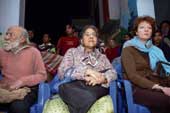 |
| Ketaki Kushari Dyson (centre) and Gail Rosier with dramatist Badal Sircar (extreme left) during a performance at Loreto Sealdah. Picture by Sanjoy Chattopadhyaya |
Acclaimed novelist, scholar, bilingual poet, translator and dramatist Ketaki Kushari Dyson is in Calcutta, busy with groundwork for her play, the English version of Mozart Chocolate, to be staged all over England in 2006-07.
With her is British director Gail Rosier of the Acorn Music-Theatre. Rosier, based in Henley-on-Thames, and Dyson (who lives just half-an-hour?s journey away in Kidlington) had collaborated very successfully in producing Dyson?s first play Night?s Sunlight.
The play staged in Calcutta as Raater Rode, premiered in Swansea as part of the Writing Diaspora?s Conference. It was staged at various other venues and later even accepted as text by the University of Wales.
The present Calcutta visit is to be an introduction for Rosier to all things Indian, since Mozart Chocolate centres around Indian experiences.
The play (staged in Bengali in Calcutta and Santiniketan, 2001) begins with an NRI woman turning out her cupboard and musing on the different saris that have been accumulating over the years. From here the play traces the history of the sari and its significance for Indian women.
Later, the woman comes to Calcutta and finds her childhood home torn down for a multistoreyed building.
?It talks of the time when the Indian textile industry was on the brink of devastation? the post-war era when saris were difficult to get. The time when wearing a sari was a symbol of growing up and womanhood and casting it aside to wear something else was unthinkable. With this blends surrealism, philosophy, countless personal feelings and observations,? said Dyson.
The feminine discourse, the little things that fill a woman?s daily existence, are central to Dyson?s plays. ?With so many male directors, writers and actors, the Bengali theatre scene is male-dominated. The core elements of man-woman relationships get treated, but nowhere, except perhaps in the plays of Saoli Mitra, are the smaller, more essentially feminine issues touched on,? she explained.
Night?s Sunlight has focused on many women?s issues. ?It analyses the Roop Kanwar issue and questions why there is no Bengali word for menopause,? recalls Dyson.
With several Indian characters in Night, Dyson had had to ?personally guide the British actors in getting the nuances and body language right?. So this time, Rosier decided to accompany her.
The two are catching up on all the latest stage productions and meeting friends. From Badal Sircar to Saoli Mitra to Kaushik Sen to modern jatra and Chhau, they have seen it all. Rosier, who prefers physical drama and live music, feels Badal Sircar is ?the pinnacle?.
Mozart Chocolate, in which Rosier hopes to combine different forms, is to her ?a beautiful mixture of poetry, lyricism and intellectual prowess.?
Dyson shares her enthusiasm about Calcutta?s theatre scene. ?A few years ago, things had wilted. But now, I find a great vibrancy. There are many new productions and a lot more emphasis is being given to text and language, which I find encouraging. Deepdanda (by Bohurupee), for instance, has some fine dialogues,? said Dyson.
With a collection of poems and essays set for release at this year?s Book Fair, she wishes someone would stage her third play Suparnarekha, circa 2002.











